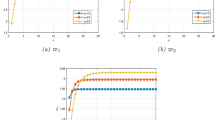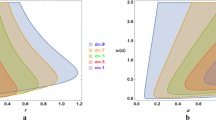Abstract
This inquire about ponder is committed to investigating a few properties in connection to behaviors of solutions to an extended fractional structure of the standard jerk equation. Here, we define the scheme of the general fractional jerk problem using the generalized G operators. The existence result of such a new model is derived and analyzed based on some inequalities and fixed point tools. Furthermore, analysis of its Ulam–Hyers–Rassias type stability is performed and finally, we give numerical simulations for the existing parameters of the mentioned fractional G-jerk system in the Katugampola, Caputo–Hadamard and Caputo settings under different arbitrary orders.




Similar content being viewed by others
Data Availability and Materials
Data sharing not applicable to this article as no datasets were generated or analyzed during the current study.
References
Ghanbari, B.: On the modeling of the interaction between tumor growth and the immune system using some new fractional and fractional-fractal operators. Adv. Differ. Equ. 2020, 585 (2020). https://doi.org/10.1186/s13662-020-03040-x
Ghanbari, B.: On approximate solutions for a fractional prey-predator model involving the Atangana–Baleanu derivative. Adv. Differ. Equ. 2020, 679 (2020). https://doi.org/10.1186/s13662-020-03140-8
Itik, M., Banks, S.P.: Chaos in a three-dimensional cancer model. Int. J. Bifurc. Chaos 20(1), 71–79 (2010). https://doi.org/10.1142/S0218127410025417
Elsonbaty, A.R., El-Sayed, A.M.: Further nonlinear dynamical analysis of simple Jerk system with multiple attractors. Appl. Math. Lett. 87, 1169–1186 (2017). https://doi.org/10.1007/s11071-016-3108-3
Liu, C.S., Chang, J.R.: The periods and periodic solutions of nonlinear Jerk equations solved by an iterative algorithm based on a shape function method. Appl. Math. Lett. 102, 106151 (2020). https://doi.org/10.1016/j.aml.2019.106151
Gottlieb, H.P.W.: Harmonic balance approach to periodic solutions of nonlinear Jerk equations. J. Sound Vib. 271(3–5), 671–683 (2004). https://doi.org/10.1016/S0022-460X(03)00299-2
Ma, X., Wei, L., Guo, Z.: He’s homotopy perturbation method to periodic solutions of nonlinear Jerk equations. J. Sound Vib. 314(1–2), 217–227 (2008). https://doi.org/10.1016/j.jsv.2008.01.033
Saifur Rahman, M., Hasan, A.S.M.Z.: Modified harmonic balance method for the solution of nonlinear Jerk equations. Results Phys. 8, 893–897 (2018). https://doi.org/10.1016/j.rinp.2018.01.030
Prakash, P., Rajagopal, K., Singh, J.P., Roy, B.K.: Megastability in a quasi-periodically forced system exhibiting multistability, quasi-periodic behaviour, and its analogue circuit simulation. AEU-Int. J. Electron. Commun. 92, 111–115 (2018). https://doi.org/10.1016/J.AEUE.2018.05.021
Prakash, P., Singh, J.P., Roy, B.K.: Fractional-order memristor-based chaotic jerk system with no equilibrium point and its fractional-order backstepping control. IFAC-PapersOnLine 51(1), 1–6 (2018). https://doi.org/10.1016/j.ifacol.2018.05.001
Alqarni, M.M., Amin, R., Shah, K., Nazir, S., Awais, M., Alshehri, N.A., Mahmoud, E.E.: Solution of third order linear and nonlinear boundary value problems of integro-differential equations using Haar wavelet method. Results Phys. 25, 104176 (2021). https://doi.org/10.1016/j.rinp.2021.104176
Amin, R., Shah, K., Mlaiki, N., Yüzbaşı, Ş, Abdeljawad, T., Hussain, A.: Existence and numerical analysis using Haar wavelet for fourth-order multi-term fractional differential equations. Comput. Appl. Math. 41(7), 329 (2022). https://doi.org/10.1007/s40314-022-02041-8
Ahmad, S., Ullah, A., Shah, K., Akgül, A.: Computational analysis of the third order dispersive fractional PDE under exponential-decay and Mittag–Leffler type kernels. Numer. Methods Partial Differ. Equ. 39(6), 4533–4548 (2023). https://doi.org/10.1002/num.22627
Abuasbeh, K., Qureshi, S., Soomro, A., Awadalla, M.: An optimal family of block techniques to solve models of infectious diseases: Fixed and adaptive stepsize strategies. Mathematics 11(5), 1135 (2023). https://doi.org/10.3390/math11051135
Alquran, M., Ali, M., Gharaibeh, F., Qureshi, S.: Novel investigations of dual-wave solutions to the Kadomtsev–Petviashvili model involving second-order temporal and spatial-temporal dispersion terms. Partial Differ. Equ. Appl. Math. 8(5), 100543 (2023). https://doi.org/10.1016/j.padiff.2023.100543
Ragusa, M.A., Razani, A., Safari, F.: Existence of radial solutions for a \(p(x)\)-Laplacian Dirichlet problem. Adv. Differ. Equ. 2021, 215 (2021). https://doi.org/10.1186/s13662-021-03369-x
Etemad, S., Rezapour, S., Samei, M.E.: On a fractional Caputo-Hadamard inclusion problem with sum boundary value conditions by using approximate endpoint property. Math. Model. Appl. Sci. 43(17), 9719–9734 (2020). https://doi.org/10.1002/mma.6644
Rezapour, S., Samei, M.E.: On the existence of solutions for a multi-singular pointwise defined fractional \(q\)-integro-differential equation. Boundary Value Problems 2020, 38 (2020). https://doi.org/10.1186/s13661-020-01342-3
Abbas, M.I., Ragusa, M.A.: On the hybrid fractional differential equations with fractional proportional derivatives of a function with respect to a certain function. Symmetry 13, 264 (2021). https://doi.org/10.3390/sym13020264
Samei, M.E., Rezapour, S.: On a system of fractional \(q\)-differential inclusions via sum of two multi-term functions on a time scale. Boundary Value Problems 2020, 135 (2020). https://doi.org/10.1186/s13661-020-01433-1
Akdemir, A.O., Karaoglan, A., Ragusa, M.A., Set, E.: Fractional integral inequalities via Atangana–Baleanu operators for convex and concave functions. J. Function Spaces 2021, 1055434 (2021). https://doi.org/10.1155/2021/1055434
Baitiche, Z., Derbazi, C., Matar, M.M.: Ulam stability for nonlinear Langevin fractional differential equations involving two fractional orders in the \(\psi \)-Caputo sense. Applicable Analysis (2021). https://doi.org/10.1080/00036811.2021.1873300
Boutiara, A., Guerbati, K., Benbachir, M.: Caputo-Hadamard fractional differential equation with three-point boundary conditions in Banach spaces. AIMS Math. 5(1), 259–272 (2019). https://doi.org/10.3934/math.2020017
Boutiara, A., Guerbati, K., Benbachir, M.: Caputo type fractional differential equation with nonlocal Erdelyi–Kober type integral boundary conditions in Banach spaces. Surveys Math. Appl. 15, 399–418 (2020)
Etemad, S., Rezapour, S., Samei, M.E.: \(\alpha \)-\(\psi \)-contractions and solutions of a \(q\)-fractional differential inclusion with three-point boundary value conditions via computational results. Adv. Differ. Equ. 2020, 218 (2020). https://doi.org/10.1186/s13662-020-02679-w
Mahmudov, N., Matar, M.M.: Existence of mild solution for hybrid differential equations with arbitrary order. TWMS J. of Pure Appl. Math. 8(2), 160–169 (2017)
Shah, K., Khalil, H., Khan, R.A.: Investigation of positive solution to a coupled system of impulsive boundary value problems for nonlinear fractional order differential equations. Chaos Solitons Fract. 77, 240–246 (2015). https://doi.org/10.1016/j.chaos.2015.06.008
Hajiseyedazizi, S.N., Samei, M.E., Alzabut, J., Chu, Y.: On multi-step methods for singular fractional \(q\)-integro-differential equations. Open Math. 19, 1378–1405 (2021). https://doi.org/10.1515/math-2021-0093
Samei, M.E., Ahmadi, A., Selvam, A.G.M., Alzabut, J., Rezapour, S.: Well-posed conditions on a class of fractional \(q\)-differential equations by using the Schauder fixed point theorem. Adv. Differ. Equ. 2021, 482 (2021). https://doi.org/10.1186/s13662-021-03631-2
Baleanu, D., Etemad, S., Mohammadi, H., Rezapour, S.: A novel modeling of boundary value problems on the glucose graph. Commun. Nonlinear Sci. Numer. Simul. 100, 105844 (2021). https://doi.org/10.1016/j.cnsns.2021.105844
Sousa, J.V.D.C., de Oliveira, E.C.: On the Ulam-Hyers-Rassias stability for nonlinear fractional differential equations using the \(\psi \)-Hilfer operator. J. Fixed Point Theory Appl. 20, 96 (2018). https://doi.org/10.1007/s11784-018-0587-5
Ben Chikh, S., Amara, A., Etemad, S., Rezapour, S.: On Ulam–Hyers–Rassias stability of a generalized Caputo type multi-order boundary value problem with four-point mixed integro-derivative conditions. Adv. Differ. Equ. 2020, 680 (2020). https://doi.org/10.1186/s13662-020-03139-1
Abdeljawad, T., Agarwal, R.P., Karapinar, E., Kumari, P.S.: Solutions of the nonlinear integral equation and fractional differential equation using the technique of a fixed point with a numerical experiment in extended \(b\)-metric space. Symmetry 11(5), 686 (2019). https://doi.org/10.3390/sym11050686
Matar, M.M., Abbas, M.I., Alzabut, J., Kaabar, M.K.A., Etemad, S., Rezapour, S.: Investigation of the \(p\)-Laplacian nonperiodic nonlinear boundary value problem via generalized Caputo fractional derivatives. Adv. Differ. Equ. 2021, 68 (2021). https://doi.org/10.1186/s13662-021-03228-9
Padder, A., Almutairi, L., Qureshi, S., Soomro, A., Afroz, A., Hincal, E., Tassaddiq, A.: Dynamical analysis of generalized Tumor model with Caputo fractional-order derivative. Fractal Fract. 7(3), 258 (2023). https://doi.org/10.3390/fractalfract7030258
Qureshi, S., Akanbi, M.A., Shaikh, A.A., Wusu, A.S., Ogunlaran, O.M., Mahmoud, W., Osman, M.S.: A new adaptive nonlinear numerical method for singular and stiff differential problems. Alex. Eng. J. 74, 585–597 (2023). https://doi.org/10.1016/j.aej.2023.05.055
Kilbas, A.A., Srivastava, H.M., Trujillo, J.J.: Theory and Applications of Fractional Differential Equations. Elsevier, Amsterdam, Netherlands (2006)
Samko, S.G., Kilbas, A.A., Marichev, O.I.: Fractional Integrals and Derivatives: Theory and Applications. Gordon and Breach, Philadelphia (1993)
Almeida, R.: A Caputo fractional derivative of a function with respect to another function. Commun. Nonlinear Sci. Numer. Simul. 44, 460–481 (2017). https://doi.org/10.1016/j.cnsns.2016.09.006
Almeida, R., Malinowska, A.B., Teresa, N., Monteiro, T.: Fractional differential equations with a Caputo derivative with respect to a kernel function and their applications. Math. Methods Appl. Sci. 41(1), 336–352 (2018). https://doi.org/10.1002/mma.4617
Granas, A., Dugundji, J.: Fixed Point Theory. Springer, New York (2003)
Acknowledgements
The third and fifth authors were supported by Azarbaijan Shahid Madani University. J. Alzabut is thankful to Prince Sultan University and OSTİM Technical University for their endless support for writing this paper.
Funding
Not applicable.
Author information
Authors and Affiliations
Contributions
All authors have equal contributions. All authors read and approved the final manuscript. MMM: Initial draft, methodology, actualization, formal analysis, validation, investigation, and initial draft. MES: Actualization, formal analysis, validation, investigation, software, simulation, and was a major contributor in writing the manuscript. SE: Actualization, methodology, formal analysis, validation, investigation, software, simulation, initial draft and was a major contributor in writing the manuscript. AA: Actualization, validation, methodology, formal analysis, investigation, and initial draft. SR: Validation, methodology, actualization, formal analysis, investigation, and initial draft. JA: Investigation, initial draft, formal analysis, actualization, methodology, validation, and supervision of the original draft and editing. All authors read and approved the final manuscript.
Corresponding authors
Ethics declarations
Conflict of interest
The authors declare that they have no competing interests.
Additional information
Publisher's Note
Springer Nature remains neutral with regard to jurisdictional claims in published maps and institutional affiliations.
Rights and permissions
Springer Nature or its licensor (e.g. a society or other partner) holds exclusive rights to this article under a publishing agreement with the author(s) or other rightsholder(s); author self-archiving of the accepted manuscript version of this article is solely governed by the terms of such publishing agreement and applicable law.
About this article
Cite this article
Matar, M.M., Samei, M.E., Etemad, S. et al. Stability Analysis and Existence Criteria with Numerical Illustrations to Fractional Jerk Differential System Involving Generalized Caputo Derivative. Qual. Theory Dyn. Syst. 23, 111 (2024). https://doi.org/10.1007/s12346-024-00970-9
Received:
Accepted:
Published:
DOI: https://doi.org/10.1007/s12346-024-00970-9
Keywords
- Generalized fractional operators
- Jerk equation
- Stability
- Fractional differential equation
- Functional equations




